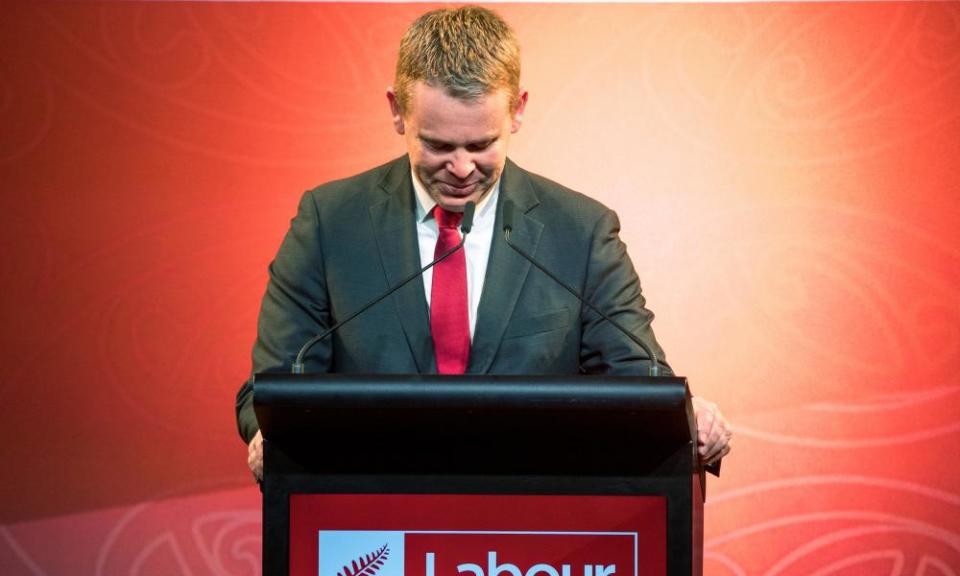New Zealand abandons Labour and shifts to the right as country votes for wholesale change

New Zealand voters have delivered a forceful rejection of the Labour government as a surge in support for the National party delivered what analysts described as a “bloodbath” for the government and a new right-leaning era for politics in the country.
The result marked a dramatic change in fortunes for the Labour party, which three years earlier – led by Jacinda Ardern - secured a historic mandate, but saw its support dwindle in the face of rising living costs and the Covid pandemic.
Speaking to a large crowd of party-faithful at his election night event in Auckland, National party leader Christopher Luxon said his party was on course to form the next government with libertarian party Act. “All over this country you have reached for hope and you have voted for change,” Luxon said.
Related: From selling deodorant to running the country: New Zealand’s new PM, Christopher Luxon
Luxon pledged to bring down the cost of living, restore law and order, as well as deliver better healthcare and education. His address came shortly after Labour leader Chris Hipkins conceded that his party had lost the election. Analysts variously described the jump in support for National as a “bluenami” and “nightmare” for the government.
New Zealand’s shift to the right ends Labour’s six years in office, which coincided with the Covid-19 pandemic, the Christchurch mosque attacks and the Whakaari volcano eruption. It will firmly draw a line under Ardern’s era of politics.
More than 95% of the vote had been counted late Saturday, local time. National was predicted to gain 50 seats, and its traditional coalition party Act on 11 seats, just on the 61 seats needed to govern. With some results still to be counted, the remaining question was whether it would be forced to bring a third party – populist New Zealand First – into their governing deal.
Luxon thanked Hipkins for his time serving New Zealand as prime minister.
“I wished him well, because it is obviously a tough night for Labour.”
Speaking at an election night event in Wellington, Hipkins - who became Labour leader in January after Jacinda Ardern’s surprise resignation – said he had called the opposition leader Luxon to congratulate him on the results.
“As it stands Labour is not in a position to form another government,” he said. “The result is not one any of us wanted.”
“It was going to be an uphill battle. No government has replaced a prime minister in an election year and gone on to win.”
Acknowledging the natural disasters, terrorist attack and pandemic that marred his government’s term, Hipkins said: “I honestly think that the Gods rounded up curveballs to throw at us.”
Hipkins became emotional, thanking his family, and was met with cheers of “Chippy” – his nickname - from his supporters.

It is an extraordinary change in fortune for the party, which in 2020 – then under Ardern’s leadership – was voted into power in a landslide, giving it the biggest mandate in nearly 30 years.
But the country has revealed its mood for change in the years since that historic victory. The rising cost of living and post-pandemic malaise has translated into dissatisfaction with the political status quo, and Hipkins failed to amass the extraordinary popularity of his predecessor.
In a telling display of the country’s malaise, Labour not only bled seats to the right, but also to smaller parties on the left – the Green Party and Te Pāti Māori, which captured votes from those wanting to see greater action on climate change, transformative investment in the social security net and better outcomes for Maori.
The Green Party appear set to gain 14 seats and managed to take some of Labour’s safest seats, including Wellington Central, which has been held by Labour since 1999 and Rongotai, held since 1996.
Opinion polls in the lead up to the election had the populist minor party New Zealand First once again in the kingmaker position, and there is reasonable chance National and Act will still need them, once the special votes comes in and if there is an “overhang” from Te Pāti Māori winning some of the Māori electorate seats.

 Yahoo News
Yahoo News 
